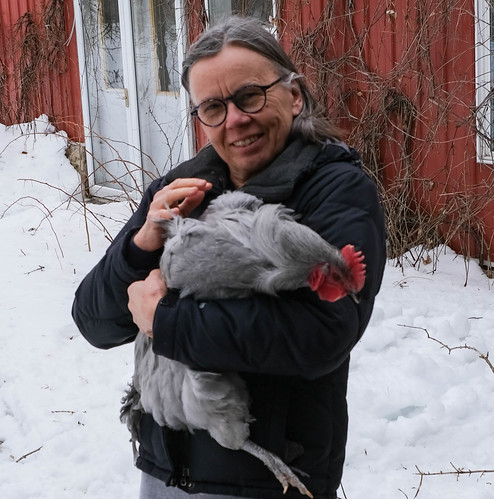
Whaaat? You got a rooster? -- That is a perfectly understandable reaction. There is much to be said about not keeping roosters with your hens. But late last night, when we absolutely had to decide about the pick up of a Lavender Orpington rooster (that is his breed), the "yay" votes had it. (Then, at about 4 a.m., I changed my mind once again, but Ed talked me down from my concerns. Too, I know that at 4 a.m., the most tame option can seem horrifyingly scary. You should never decide anything at that hour.)
The choice had been between two options: buy a new coop that is big enough for all and comes with what is called a "run" -- a fenced in portion where they can "run free" -- or, get a rooster and set them all out to truly free range, like before, only with a body guard.
As you know, I wanted to fence in the girls. But you do not understand the habits and mores of predators until you've lived in their midst for some years and we are becoming quite the experts. To be really predator safe, a run has to be fenced also from the top (against hawks) and perhaps more importantly -- from the bottom. But if you put in wires on the ground, then the hens can't scratch. They can't look for bugs or worms. They can't bathe in dust piles. They really can't do anything except hurt their claws in frustration. Most people, therefore, do not put fencing on the bottom.
A second alternative is to dig in a sturdy wire mesh (hardware cloth) ideally four feet around the run, so that no predator could dig his way in. Not only is that a terribly odious chore in our hard clay soil (to say nothing of frozen hard clay soil), but, too, it means that the coop and run have to stay put forever and ever, even when every last bit of grass is gone (scratched out by the chickens), even when the run is one big mud pile, covered with chicken droppings, even when you're old and feeble and the last thing you want to look at is a coop with a run in your yard.
Most people don't do any of this. They buy the coop and the run, the hens go into the coop at night, doors are locked and chickens remain safe. Until the evening when the hens go in too early and a weasel or a racoon or a possum dig in and one hour later you come out to a coop filled with dead chickens. Because they're all trapped. Some predators will hunt only until they get their hen, but others (weasels come to mind) hunt down chickens just for the sport of killing them. Perhaps they brag at the weasel cafe how many they butchered that day.
And so the "coop with run" idea became less and less attractive. The effort to secure them completely is huge and in the end, they're caged birds, locked in a small area of mud. And if you don't secure them from the bottom, some animal will dig in and your entire flock turns into chicken pie on some predator's table.
Even as hawks hovered over the farmette and possum roamed the property, we decided, from the point of view of the cheepers, the better option is to set them free, with, perhaps, some better protection. Orpington roosters are supposed to be more docile than others, but if you ask me, all this is speculative and a rooster's disposition doesn't become obvious until he matures and starts breeding with the girls. Ed promises that Happy, named jointly by Snowdrop and me, hopefully not in any ironic fashion, would leave the minute he shows signs of being a meanie.
At least the weather is cooperative in the early morning. Cloudy, just a touch below freezing, but hey, it's March -- you have to be prepared for fluctuations.
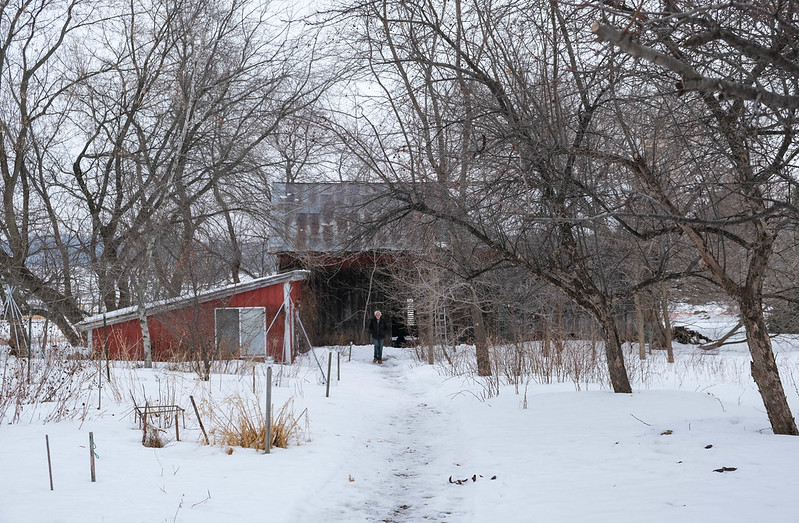
Our indoor world is cheerful and warm. Breakfast is luxurious!
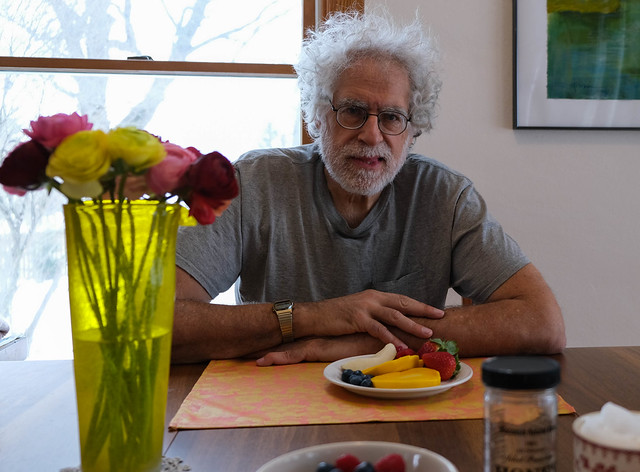
The kitties stay to the back of the garage, keeping out of the wind. Stop Sign hangs out in the barn, possibly chasing mice, possibly snuggling under the warm quilt we've thrown over the coop. And Whiskers? Oh, he's around. Elusive and beautiful as always.
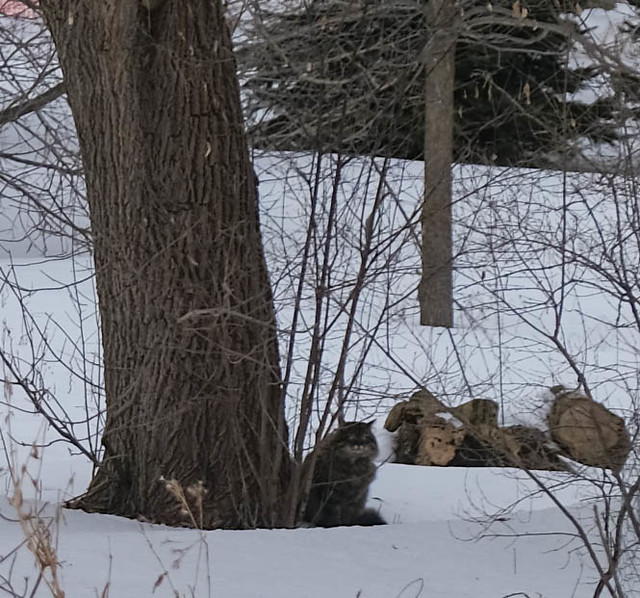
Ed and I pick up the rooster in the parking lot of Denny's Restaurant. That's the way these private sales usually go: a big car drives up, an animal carrying case comes out, a chicken is transferred.
On our drive home, we stop by Goodwill to drop off a sack of discarded stuff. The employee looks in the back of the car, sees Happy and asks if he's part of the drop off. I almost say yes, please.
The cheepers come down from the sheltered roost when they hear us coming. Possibly they are expecting some treats. They get a Lavender Orpington housemate instead. And yes, he really is a shade of lavender gray. Like the flower only different.
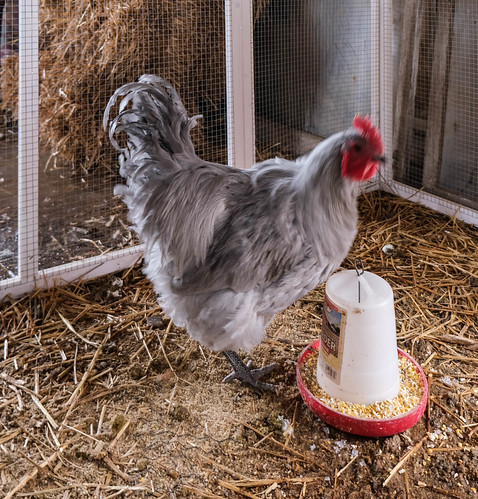
Everything appears calm when I leave the barn. Ed checks a few minutes later and reports that Happy is now hanging upstairs, in the comfy wood shavings, and the girls are all downstairs. I don't know that he has exactly chased them out. Maybe they're discussing the new situation. There is no blood, there are no feathers in the air. We are grateful for that. (Happy is just seven months old. Roosters are mostly calm at this age and darn it, he's an Orpington! We're banking on the inflated reputation of this breed! We dished out a whole $5 for him. That's right, no one wants roosters -- you practically have to pay people to take them.)
In the afternoon, the rain comes down. I mean, really hard. We're just one degree above freezing now and sometimes that rain looks awfully much like wet snow. Ed has put up covered food stations for the cats that should be (mostly) cheeper-proof, but honestly, unless the weather improves or they start fighting in that coop, I see no reason to let the cheepers out tomorrow or even the next day. There's nothing to scratch, no bare spots of dirt to enjoy.
By evening, there's no ambiguity: that stuff that's coming down? It's snow and ice -- this year's toxic mixture. I turn up my jacket collar and head out on my final animal inspection. All good in the garage. And the barn? What's happening in the coop? I come in quietly, listening. Nothing. I peer in the coop. No one downstairs.
Well now! They're all up in the roost. Sleeping together, snuggling out of necessity (it's pretty tight up there for six very large chickens). Could it be that Happy is actually... happy?
We will wait to see what happens. And in waiting, we will be cheerfully optimistic. Why imagine the horrors of animal incompatibility when in fact, all could go well?
And so we wait: for good stories about our various animals. And for the real arrival of spring.

